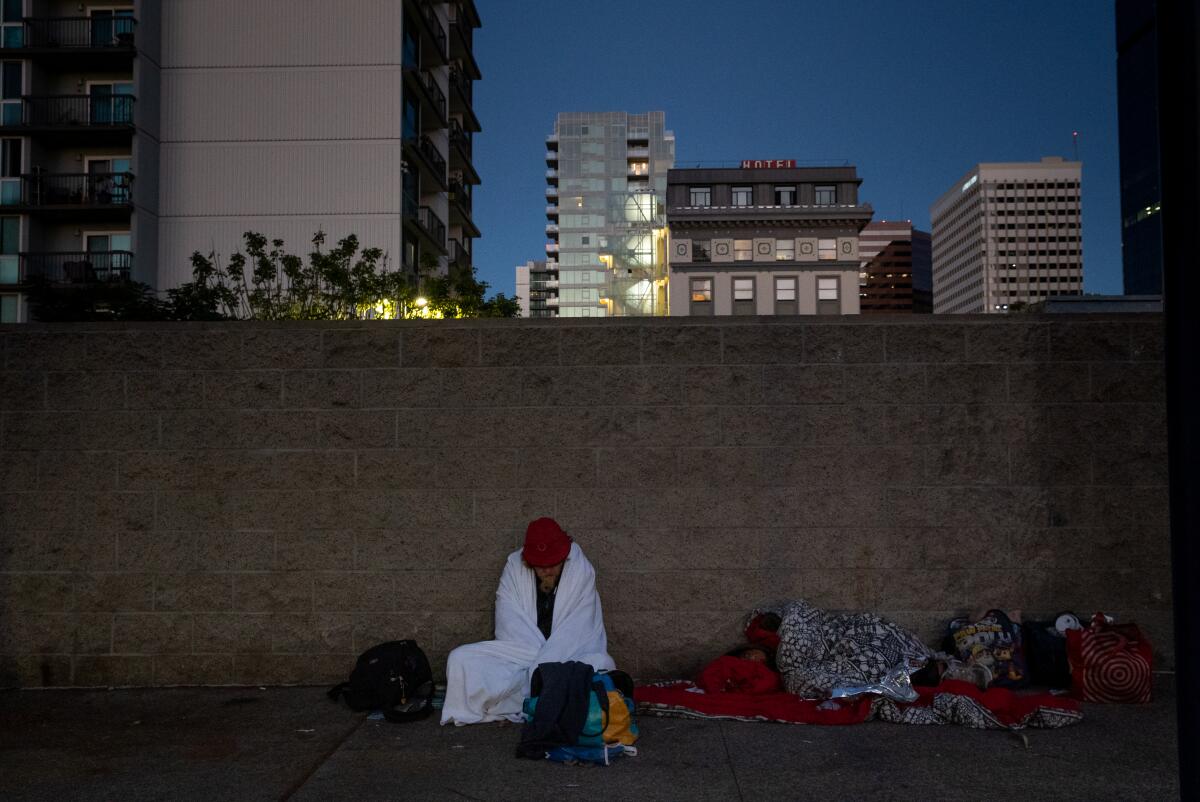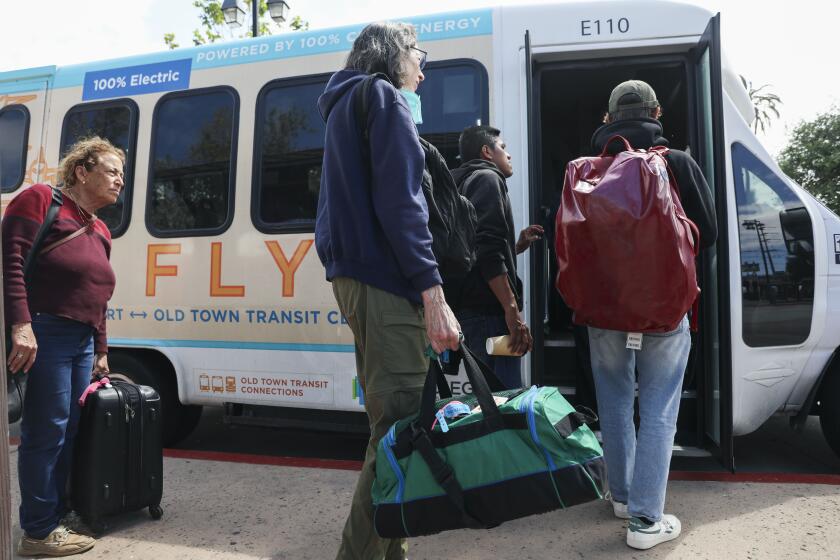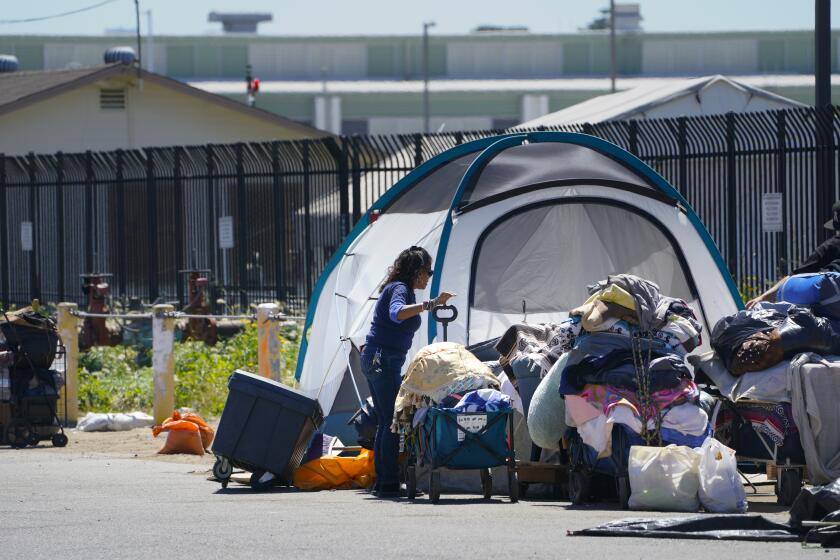Column: ‘CARE Courts’ are coming to address mental illness. Is California ready for them?

Legislation that could force certain people into treatment and conservatorships trigger concerns over resources, rights
Thousands of people with mental illness live on the streets of California, and virtually everyone wants to find a way to help them.
Proposals giving government more leverage to put some of them into court-ordered treatment are moving through the Legislature quickly with bipartisan support.
But the near unanimity among lawmakers has not erased concern about whether enough resources will be there to make this work, or the larger foundational question about when it is appropriate for the state to curtail personal liberty in the interest of the individual and the public.
This story is for subscribers
We offer subscribers exclusive access to our best journalism.
Thank you for your support.
Several bills seek to overhaul how mental illness is addressed across the state, but most of the discussion has been over two measures.
One would create a legal process to put people into treatment through so-called CARE Court. The other would make it easier to place people under conservatorship, which is when a judge appoints a person or organization to care for adults who cannot care for themselves or manage their own finances.
Gov. Gavin Newsom’s proposal for Community Assistance, Recovery, and Empowerment Court was approved on a 39-0 vote in the state Senate last month and recently breezed through two Assembly committees.
The CARE Court is not only targeted for troubled homeless people, but other individuals who suffer from mental illness and substance abuse who have proved difficult or impossible for family members and others to help.
Some critics contend this is a wrong approach to dealing with people living on the street and stress that housing and support services are what’s needed. The CARE Court system is not intended to tackle homelessness broadly, however. The system would only affect a small portion of those living without shelter.
State Sen. Tom Umberg, D-Santa Ana, author of Senate Bill 1338, estimates between 7,000 and 12,000 people will qualify for CARE Court each year. Even if all of them were homeless — and they wouldn’t be — that’s less than 8 percent of the approximately 161,000 homeless people in California.
The conservatorship measure, Senate Bill 1416, also passed unanimously out of the Senate and the Assembly Health Committee as well, and was approved by the Assembly Judiciary Committee with only one “no” vote.
Current law allows people to be put into conservatorship if they are “gravely disabled,” which, among other things, is described as “a condition in which a person, as a result of a mental health disorder, is unable to provide for the basic personal needs of food, clothing, or shelter.”
The bill would expand that definition to include that such a person “is unable to provide for the basic personal needs of medical care, as specified.”
The two bills are linked in that a person who refused to participate in CARE Court eventually could be put into conservatorship.
As California heads down this path, the state is facing shortages in behavioral health care workers, treatment programs and housing.
According to the RAND Institute, California needs nearly 5,000 more psychiatric beds for short- and medium-term care, and 3,000 more long-term care beds.
A 2018 UC San Francisco study said that by 2028, the state is expected to have 50 percent fewer psychiatrists and 28 percent fewer psychologists, licensed therapists and social workers than needed because of retirement and attrition.
The pandemic exacerbated that shortage, according Dr. Le Ondra Clark Harvey, CEO of the California Council of Community Behavioral Health Agencies.
“As the system currently stands, we’re already struggling,” Harvey told KQED, the public radio station in San Francisco. “We need to be able to have dependable, well-trained workers within this CARE Court system to make it successful.”
Newsom has opened up the purse strings to address some of those concerns. His budget last year allocated $12 billion for homeless and mental health programs, with $2 billion more proposed in this year’s budget.
The governor specifically proposed $65 million to implement CARE Court, which would help counties set up the systems, finance a supporter program and provide training and technical assistance.
But the debate goes far beyond resources.
During an Assembly Health Committee hearing last week, representatives from the nonprofit Cal Voices and Disabilities Rights California spoke against the conservatorship bill, which they said was unnecessary and would deprive people of their basic autonomy.
A letter signed earlier by Disability Rights California, the American Civil Liberties Union, Western Center on Law and Poverty and others said the CARE Courts bill “ignores specific procedures that California requires to determine whether a person lacks capacity to make medical decisions.”
The letter also maintains that evidence shows “adequately-resourced intensive voluntary outpatient treatment” is more effective than court-ordered treatment.
Linda Mimms, a Poway mental health care advocate, supports the CARE Court legislation and backs expanding the definition of conservatorships, which she continues to say should be used as a last resort and only for “our sickest people.”
“It is inhumane to allow continued suffering and ultimately, death, without medical intervention,” said Mimms, vice chair of the Schizophrenia & Psychosis Action Alliance, in a letter to The San Diego Union-Tribune.
Under the CARE Court legislation, people entering the system would be assigned public defenders, who presumably would view the public agencies seeking mandated treatment of their clients as adversaries — similar to typical court settings.
Experts say the CARE Court and expanded conservatorships can’t be done in isolation and need to be part of a multifaceted and improved mental health care system.
The CARE Court and conservatorship expansion are barreling ahead in the Legislature, and the governor and San Diego County have ramped up spending on mental health services.
There are clearly people out there who need help, even if they don’t realize it. These programs — if done right — could help them get it.
It’s up to the state and local governments to make sure these new approaches work properly and protect the individual. And it’s up to the advocates on both sides to call them out if they don’t.
UPDATE: The column has been corrected to reflect that Linda Mimms is a mental health advocate, not a counselor, and clarifies her position on the legislation.
Get Essential San Diego, weekday mornings
Get top headlines from the Union-Tribune in your inbox weekday mornings, including top news, local, sports, business, entertainment and opinion.
You may occasionally receive promotional content from the San Diego Union-Tribune.












